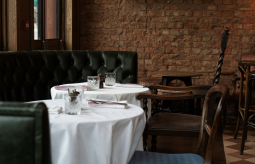The Innovative Winemakers who Won a Great British Food Award 2021

Dani R
We meet the husband and wife team behind Fox & Fox, who won the ‘Wine’ category in the Great British Food Awards 2021 for its Inspiration Brut
We absolutely loved Fox & Fox’s Inspiration Brut; a lively, effervescent wine. So did judge Tom Hunt, who praised its ‘balanced zesty flavours, fine fizz and subtle mineral-honey aroma.’ He also praised the duo’s ‘minimal intervention approach to viticulture’ and the work they do on their farm to help increase its biodiversity. We spoke to Jonica Fox to find out more.
When did you and your husband decide to become wine makers?
The idea started on an early summer’s day in 2003. Gerard had enjoyed a glass of English fizz in London and came back bubbling with enthusiasm. Next thing I knew I was booked on to Plumpton College’s Introduction to Vititculture week and he was dreaming of popping the first cork. I loved the week which threw up two things: one, grapevines are fascinating; and two, a one-week course was not enough. I signed up for the full course and started to make plans to plant our first vines in 2004. Seems so long ago now.
You take a ‘minimal intervention’ approach in your vineyard - what does that mean?
We take a minimal intervention approach to both the vineyard and the wine making. In the vineyard it means we invest heavily in canopy management and vine nutrition and don’t use insecticides. We encourage natural wildlife from soil micro-organisms to the hawks and buzzards that keep small birds in hiding and out of our grapes (the exception being a handful of fat pheasant who are only too happy to stuff themselves once the grapes ripen). In the winery, we focus on small batch wines made without additives to let the true flavours of the fruit sing through. This allows us to be innovative and make wines like our Pinot-Gris-based ‘Inspiration’.
What else are you doing to protect the environment and encourage biodiversity?
We have spent many years enhancing what was an already good ecosystem here. We add compost to the vine rows on a five year cycle to improve the soil and provide nutrients, we encourage meadow species on the margins and headlands with a minimum mow regime, we let the grass grow taller at the end of the season to reduce winter rainfall-erosion, and we leave some areas of pond and woodland nearby to look after themselves. That creates a wide biodiversity. I am always particularly pleased to see the wild orchids every spring, and the hedgerow and meadow-grass butterflies in the summers.
How does the terroir of the High Weald impact the taste of your wines?
Our soils are ancient; they lay beneath the now eroded chalk cap that ran from the North Downs to the South Downs and on across France . Our soils are sedimentary clays and clay loams with fingers of green sand; they produce rich, rounded fruit flavours and an enticing, subtle note of salinity. It makes for deliciously balanced wines.
Being a winemaker sounds like a dream job, but we’re sure it has its challenges! What are the biggest ones?
Much of it is like any other artisan business: a focus on ingredient quality; a vision of the product we want to create and the attention to detail that gets us between the two points. The biggest challenge is that there just aren’t enough hours in the day.
And what are the biggest rewards?
The rewards are complex for me. They encapsulate the stress and joy of growing good grapes, the transformation into a product we are proud of, the pleasure we get from customers enjoying the wine and ultimately, that golden Christmas morning moment when we sit down together and pop a cork.
-
Blog
• 6 days ago -
Blog
• one month ago -
Blog
• 3 months ago -
Blog
• 4 months ago
-
Review: The Ox in Clapham
6 days ago -
Review: Starling, Esher
one month ago




_1048_733_64_s_c1.jpeg)



_124_80_s_c1.jpg)



